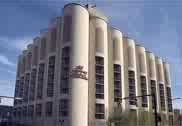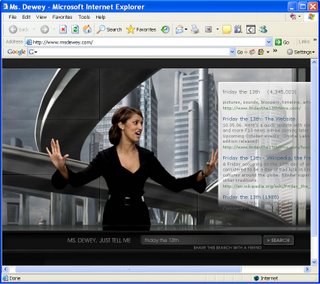Well here's my much belated
follow-up post about interviews. You've managed to brush up your resume and go through drafts to make your cover letter perfect and all that hard work has paid off when you get that phone call or email that they want to interview you. Inevitably as soon as you hang up the phone you do a little happy dance and cheer (hopefully you're not in public) because they're actually interested in you! You must be great and wonderful! Allow yourself to revel for one hour, then get to work
.
Preparation.
You want to prepare for your interview, but you don't want to sound like an over-rehearsed stage actor.
Look at the library's website, blog, catalog, etc. Remember:
familiarize don't memorize. It's a good idea to know background information about the library, including important projects, collections, organizational structure of the library and where it falls in the bigger picture. Knowing these things can help you understand why certain questions are being asked in an interview and allow you to craft a better answer. DO NOT quote them back statistics or frequently refer to this background info. It's okay to mention one of their more notable projects once especially if it's brought up, but be careful it isn't too much. It may unintentionally portray you as a know-it-all and could irritate your interviewers.
It's also a good idea to come up with a couple of general questions. Potential employers like to know that you've shown enough initiative and interest to become familiar with their library. Keep the questions general, but something that you honestly don't know and would like the answer to. Give it a bit of thought, but don't obsess over it. Sometimes questions will come up during an interview and that's fine too.
Relax and be yourself.Remember this is not the inquisition it is a conversation. This is a chance for them to meet you and you to meet them. Each is equally important. You don't want to be stuck in a job where you're well liked and appreciated, but don't feel the same about those around you. Make sure it's a good fit. You want to show your personality, but your professional personality not your leisure personality. This distinction may be a bit difficult for new librarians, but it's important to develop it. (You should already have something similar in the difference between how you act in front of professors and how you act with your friends on a Saturday.) The difficulty lies in showing your personality under pressure. This comes from confidence. Football players often listen to some music to pump them up before a game, try doing the same thing. Listen to something on the drive there that will make you feel like a winner. It's a little thing that you can build on and have running through your head if your confidence wavers during the interview. Just remember: Confidence is important and will win you the job, haughtiness and egotism will get your resume thrown in the trash. When in doubt, practice with a friend whose honest enough to tell you if you need to be more confident, or tone it down a notch.
Full-day interviews.I have thankfully never been subjected to one of these. Usually it's the librarians with faculty status who are tortured in this manner. From what little I've observed they are anything but fun. My best advice is to wear comfortable shoes, a good antiperspirant, and prepare a lot. They usually involve 2 or more interviews with different groups of people (possibly the department(s) that the position is the liaison of, other librarians in that department, etc.), sometimes a presentation about yourself, and usually a lunch with a couple of people at a place of their choosing. The good part is that the library usually picks up the tab for lunch, the bad part is that the only time you have to take a breath is if you can sneak off to the bathroom. Thankfully, though, if you're called for a full-day interview it usually means that you're in a much smaller pool of potential candidates than a regular interview since the library isn't going to want to pay for a lot of lunches. Full-day interviews are usually conducted after a round of in-person or phone interviews (which should also be prepared for if possible).
That's enough for this time. Any questions can be posted in the comments or emailed. Next time I'll discuss either the "endless wait" and/or the use of email and the internet in this process.
Tags:
library jobs,
job interviews,
Job Hunting,
Library Job Hunting









